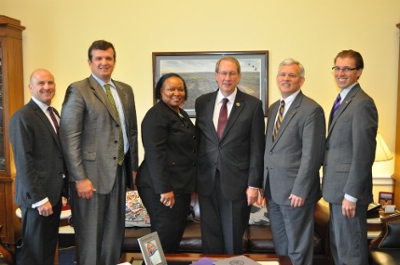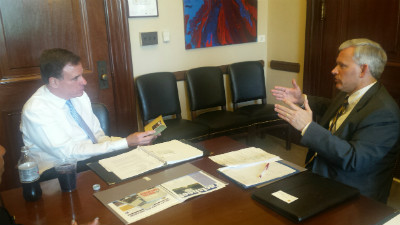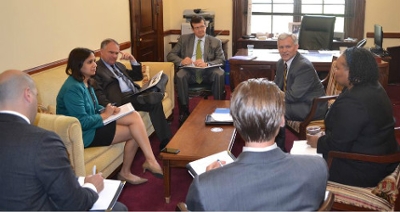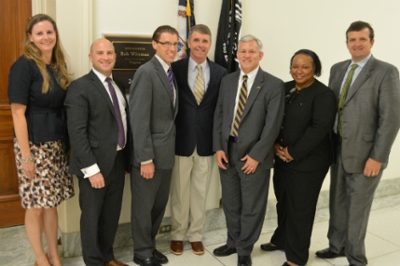JMU continues long-standing commitment to federal outreach in DC
NewsBy: Ben Delp (’05), JMU Research & Scholarship
During times of fiscal uncertainty and economic stagnation, relationship-building is of the utmost importance. In order to be successful in an increasingly competitive and global marketplace, it is imperative that the James Madison University story reaches vital stakeholders both within and beyond the Shenandoah Valley’s borders.
In response to these realities, a JMU team accompanied President Jonathan Alger to Capitol Hill for an alumni reception and briefings with members of Congress and their staff. The alumni reception, JMU on the Hill, has been held annually since 2003. The event started as an informal gathering of a handful of political science-focused alumni and JMU administrators charged with cultivating external relationships and support for research programs.
 The JMU team poses for a photo with U.S. Representative Bob Goodlatte (VA-6), whose district includes James Madison University. The JMU team poses for a photo with U.S. Representative Bob Goodlatte (VA-6), whose district includes James Madison University. |
|---|
In more than a decade, the reception has transformed into a standing-room only affair, with more than 150 alumni and friends of the university in attendance. In a deliberate strategy to bridge the generational divide, current JMU students who participate in a career workshop earlier in the day are also in attendance. During his “State of the University” address, President Alger applauded the great work of this mentorship program, and also challenged the alumni to reach out and lend a helping hand to Dukes who have recently entered the workforce.
Representatives from both sides of the aisle have made it a point to attend JMU on the Hill in recent years, with local Rep. Bob Goodlatte joining Maryland Rep. Dutch Ruppersberger at the 2015 event. JMU’s governing body, the Board of Visitors, saw two members in attendance, Lucy Hutchinson and Rector Mike Thomas. Many of the attendees are part of the JMU Politicos, an alumni group established for those working on Capitol Hill and in other public policy-oriented careers.
JMU on the Hill is a collaborative gathering, hosted by the College of Arts and Letters, Department of Political Science, and Office of Research & Scholarship.
The following day President Alger was joined by Vice Provost for Research & Scholarship Yvonne Harris, Associate Vice Provost for Research & Scholarship Ken Newbold, Director of the Center for International Stabilization and Recovery Ken Rutherford, and Director of Research Development and Promotion Ben Delp, for meetings with members of the Virginia Congressional Delegation. Similar to JMU on the Hill, an annual meeting between the President of James Madison University and members of Congress is an enduring tradition that began in the 90s with President Emeritus Ron Carrier and Vice Provost for Research and Public Service John Noftsinger leading the program.
 President Alger provides an overview of the Madison Plan and JMU’s vision to be the national model of the engaged university to U.S. Senator Mark Warner. President Alger provides an overview of the Madison Plan and JMU’s vision to be the national model of the engaged university to U.S. Senator Mark Warner. |
|---|
Despite a very busy season in Congress, the JMU team secured meetings with Reps. Goodlatte and Wittman, Sens. Warner and Kaine, and staff from the offices of Reps. Brat and Beyer. President Alger kicked off the briefings with an update on the Madison Plan and JMU’s new vision statement: To be the national model for the engaged university: engaged with ideas and the world.
Asked what JMU is doing to increase access to higher education, Mr. Alger provided an overview of the Valley Scholars Program, fresh off its inaugural year. Valley Scholars identifies middle school students with academic promise, who would be the first in their family to attend college. Beginning in their 8th grade year, the students and their families are exposed to life on a university campus: athletic events, dining halls, campus recreational facilities, and most importantly, a range of academic disciplines and potential careers. From 8th grade through high school graduation, JMU faculty and staff provide assistance with course selection, gaining financial literacy, and building the skills necessary to succeed in college and beyond. Upon graduation, those students who meet the admission criteria will be eligible for a full-ride scholarship to attend James Madison University.
Switching the subject to a conversation on ethical decision-making, President Alger presented each member and staffer with a Madison Collaborative 8 Key Questions card, and described this exciting campus-wide initiative focused on “ethical reasoning in action.” This open and flexible framework takes into account eight key values: fairness, outcomes, responsibility, character, liberty, empathy, authority, and rights, moving students one step closer to leading productive and meaningful lives in a democratic society. More than one member of Congress commented that the 8 Key Questions are an excellent framework for those in public service.
 Vice Provost for Research & Scholarship Yvonne Harris briefs U.S. Senator Tim Kaine on regional economic development projects. Vice Provost for Research & Scholarship Yvonne Harris briefs U.S. Senator Tim Kaine on regional economic development projects. |
|---|
Recognizing the importance of a growing economy, Dr. Yvonne Harris discussed JMU’s leadership role in building an innovation ecosystem in the Shenandoah Valley. The newly renovated Ice House complex is an excellent example, as this space provides one-stop shopping for collaborative economic development, entrepreneurship, and innovation programs. University leaders are working closely with local, regional, and state officials to build unique capabilities in high-demand fields, including advanced manufacturing, 3-D printing, cyber security, biotechnology, and STEM-H fields.
A discussion of JMU’s innovative approach to academics, research, and service would not be complete without Dr. Ken Rutherford of the Center for International Stabilization and Recovery. Hosted on-campus since 1996, CISR (formerly the Mine Action Information Center) brings JMU expertise to countries around the world--developing programs, technologies, and bleeding-edge scholarship in support of eliminating landmines and other unexploded remnants of war from post-conflict areas around the globe. One flagship effort is the Senior Managers’ Course (SMC), a one-of-its-kind program for senior managers from nations transitioning from war to peace, which combines JMU College of Business management training with lessons learned from the practical experiences of mine action operators. In the last decade, the SMC has trained over 275 senior managers from close to 50 countries.
CISR’s reach is incredibly far-reaching thanks to their leadership over the most circulated publications in the field. Available in print three times a year, the Journal of ERW and Mine Action has more than 2,000 subscribers in 140 countries, and when taking into account online access reaches 178 countries. The second, To Walk the Earth in Safety, is the U.S. government’s annual report for global conventional weapons destruction. CISR’s management of the publication, which includes the contributions of ten JMU student assistants, was recognized by both Secretaries of State Clinton and Kerry at formal gatherings in Washington, DC.
 More than 2,500 current JMU students call the district of U.S. Representative Rob Wittman (center) home. More than 2,500 current JMU students call the district of U.S. Representative Rob Wittman (center) home. |
|---|
JMU efforts to engage at the federal level ensures program successes reach a national audience, opening new doors for collaboration with agencies, educational institutions, industry, and policy and nongovernmental organizations. Viewed by all as a successful day on Capitol Hill, the trip was bittersweet for one member of the JMU contingent. This was the last trip to Washington, DC (in an official capacity) for long-time coordinator of JMU federal relations, Dr. Ken Newbold, who will assume the position of Provost and Executive Vice President at Goshen College in Indiana on July 1st.

